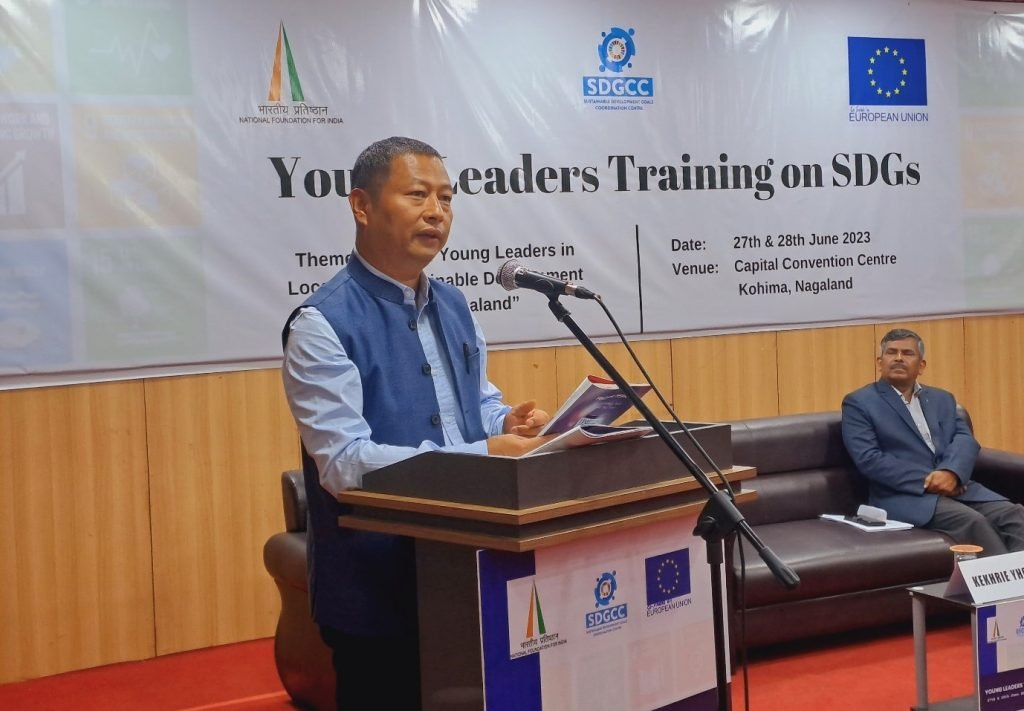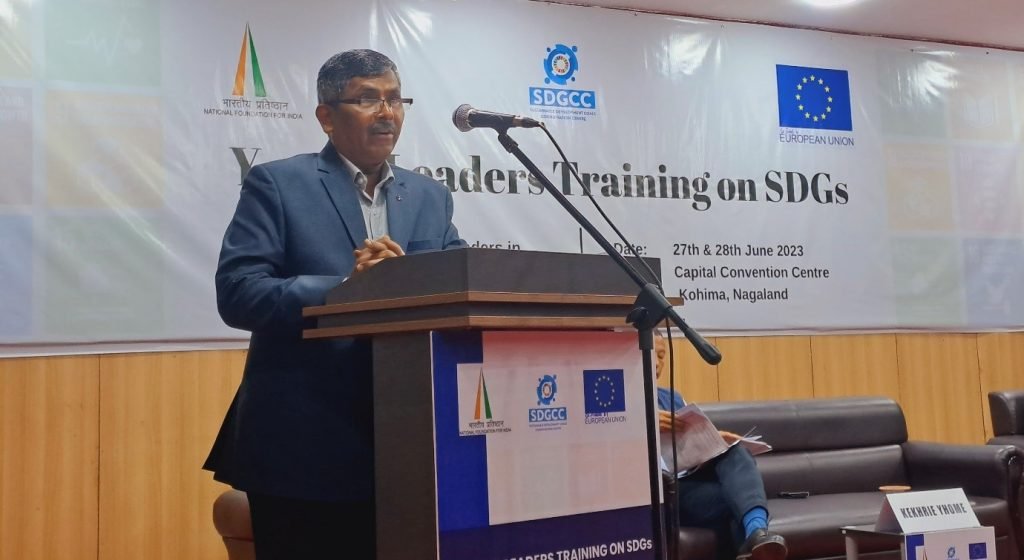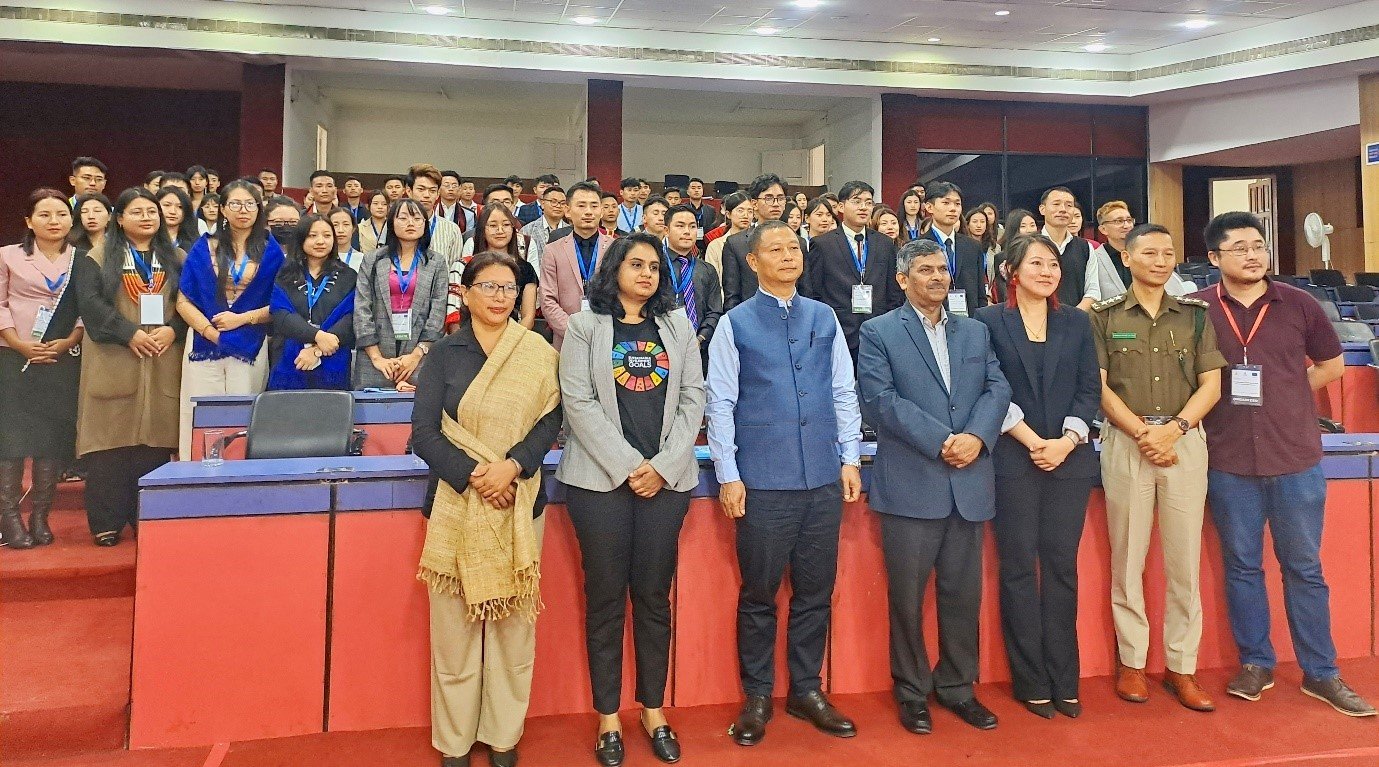A two-day Training of Young Leaders on Sustainable Development Goals (SDG) under the theme: Role of Young Leaders in Localising Sustainable Development Goals in Nagaland commenced today at Capital Convention Centre, Kohima.
Advisor for School Education & SCERT, Dr Kekhrielhoulie Yhome stressing on the topic of sustainability said that food security is still a real fear even today and hundred years down the line the fear for food security will still be a threat.
Referring to Nagas context of warriorship, Yhome said the celebration of masculinity was very much there in Naga culture however, even for a warrior the first instinct was to feed himself and his family by tilling his field.
“Our sense of security and safety does not depend on how much we can destroy but how much we care,” he added.

Advisor for School Education & SCERT, Dr Kekhrie Yhome
Mentioning that there is a generational gap in term of knowledge and systems to build the competency of a society and state, Yhome said there is not only issues with development, but the idea of sustainability is also questionable.
He stressed that local ideas must be brought which will work with local issues and local challenges.
“We need to bring workable ideas to address local problems and issues. The right holders of brining change locally are us and for that we need ideas.”
Further he said in today’s modern digital technology, there is a need to integrate how our future will be based on these ideals and act locally.
95 delegates aged between 18-25 representing all the tribes and districts were selected for the conference.
The vision of organising this conference is to conceptualize and localize SDGs.
Download Nagaland Tribune app on Google Play

R Ramakrishna, IAS, Principal Secretary (Planning) and Development Commissioner in his keynote address asserted that, Nagaland is making consistent progress in the SDG India Index published by NITI Aayog and United Nations Development Programme (UNDP) which focuses on state-level performance.
With the launch of ‘Nagaland SDG Vision 2030: Leaving No One Behind’ by Chief Minister Neiphiu Rio in August 2021, a strategic development roadmap to work coherently towards a holistic pathway for the inclusive development of Nagaland, he asserted that the State government is committed to promoting inclusive, peaceful and sustainable development for a prosperous and sustainable tomorrow.
He said the Departments are also being encouraged to sincerely implement various ongoing development programmes and schemes which are closely aligned to SDGs and bottlenecks in implementation of these schemes are flagged at the highest level for remedial actions/course correction.
Mentioning that Nagaland is a ‘front runner’ and has performed well in SDGs 1 (No Poverty), 6 (Clean Water and Sanitation), 7 (Clean and Affordable Energy), 12 (Responsible Consumption and Production), 13 (Climate Action) and 16 (Peace, Justice and Strong Institutions), he informed that the composite SDG score for Nagaland has improved from 57 in 2019 to 61 in 2020-21 and ranked 19th out of 35 states and UTS in India.

R Ramakrishna, IAS, Principal Secretary (Planning) and Development Commissioner
As per the North Eastern Region District SDG Index 2021-22 published by Ministry of of Development of North Eastern Region, NITI Aayog and UNDP which focuses on district-level performance, districts of Nagaland like Phek, Kohima, Dimapur, Mokokchung, Wokha, Mon, and Peren have scored well in certain goals i.e. Goal 2- Zero Hunger, Goal 4-Quality Education, Goal 6- Clean Water and Sanitation, Goal 5-Gender Equality. It is also heartening that Phek District ranked first across all 103 NE districts in Goal 2- Zero Hunger, said Ramakrishna.
Ramakrishna said there is scope for improving the performance of some of the poor performing indicators at the district and state levels.
He maintained that Nagaland has been actively working towards achieving the SDGs through its SDG Coordination Centre (SDGCC), embedded under the Planning & Transformation Department. And with support from NITI Aayog and UNDP, as well as implementing line departments and district administration, Nagaland has taken various initiatives to localize the SDGs and to ensure that the targets and aspirations of the people are achieved.
He exuded hope that this training for young leaders on SDGs will be fruitful and that there will be an improved understanding of the SDGs from Nagaland’s perspective and ensure we ‘leave no one behind’.

